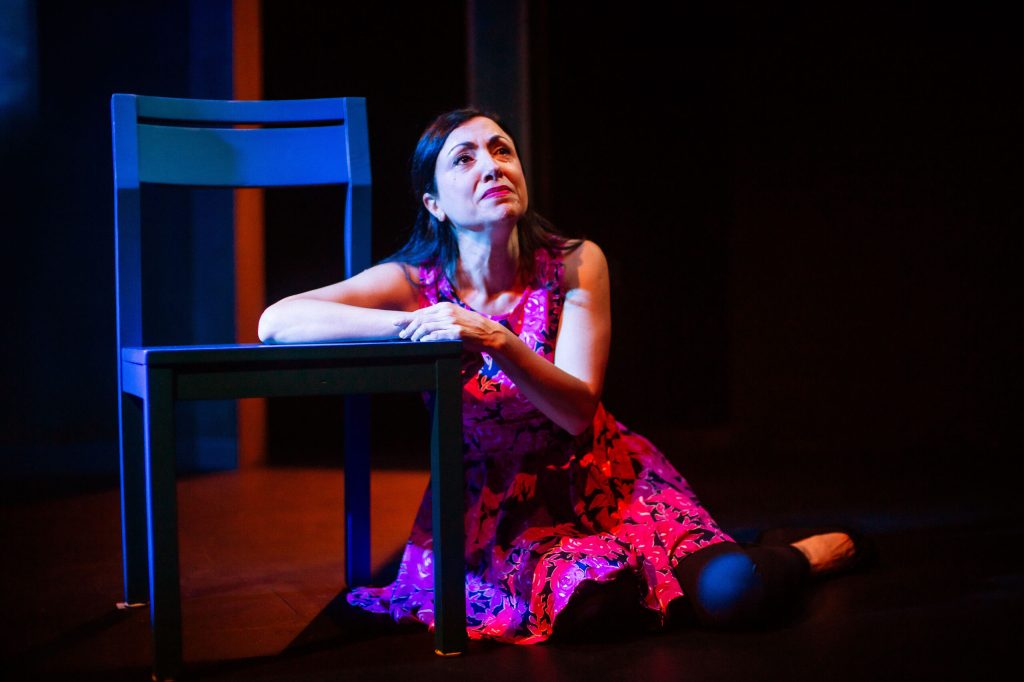
The Veterans Memorial Hall in the upscale suburb of Danville seems like the last place to see a play like “Prisontown.”
The new one-person play, a production by the Danville-based Eugene O’Neill Foundation slated to run Aug. 23-24, brushes up against some of America’s most pressing, incendiary issues: the “prison industrial complex” and the Trump administration’s crackdown on immigration.
Elsewhere in the Bay Area, San Francisco Playhouse is wrapping up a one-person show that leads audiences to consider their feelings and beliefs about the profoundly contentious Israel-Gaza conflict, even though it’s mostly meant to be a personal story. In “Home? A Palestianian Woman’s Pursuit of Life, Liberty and Happiness” (playing through Aug. 16) actress Hend Ayoub recounts growing up in Israel, but as an Arab in a society that alienates her from her Jewish best friend. She also re-creates moments when she faced discrimination in Israel and in America as she tried to make it as an actress.
“The play wasn’t written to be political,” Ayoub said. But she said it can’t help but become political “because of where I come from” – especially in the aftermath of October 7.
Ayoub’s director, Carey Perloff acknowledged the care needed to do topically-themed shows like “Home,” or “Prisontown,” which is about a U.S. Immigration and Customs Enforcement (ICE) detention facility in a poor, rural Georgia town. But she thinks it’s important for theater to tackle difficult, of-the-moment subjects, even in these polarizing times.
“This is a time of retrenchment in the theater, but I also think, you know, that it’s a time to be brave,” said Perloff, a veteran Bay Area director, producer and writer who formerly led the American Conservatory Theater.
“I think we dumb things down at our peril,” she added. “We don’t have to just do safe things. I think if it’s nuanced and it’s a rich experience, audiences will respond.”
As Perloff said, performing arts companies have had tough few years since the pandemic. They had to shutter their theaters and suspend live performances for a year or more, a situation that exacerbated an already growing trend toward smaller audiences, fewer donations and reduced subscription sales and government support.
The conventional wisdom for arts leaders would be to produce crowd-pleasing plays and musicals that fill seats and avoid alienating potential audiences with controversial subject matter Instead, theater companies are finding room to promote up-and-coming artists whose stories have long been marginalized or to present new works that provoke discussion.
“Home?” is a production of San Francisco Playhouse’s Sandbox Series, which presents “bare bones” staging of works by new playwrights. Through Aug. 25, the Israel-Gaza conflict also comes into focus via “The Return,” a “politically charged” presentation by San Francisco Golden Threads Productions, about a Palestinian man and a Jewish woman who meet at an auto-repair shop in Israel. Meanwhile, TheatreWorks Silicon Valley is winding up its 22nd annual New Works Festival Aug. 17, which featured readings of five new plays that “celebrate the human condition (and) build understanding,” while Berkeley Rep hosted its Ground Floor summer residency lab in July where 24 writers developed “groundbreaking projects representing the full spectrum of American voices.”
Perloff believes that a lot of theater-goers want to see works that encourage them to think or feel things about current events, or that illuminate new perspectives. The satire, “Luigi: The Musical,” became one of the most talked-about Bay Area shows of the past year by turning Luigi Mangione, the accused assassin of United Healthcare CEO Brian Thompson, into a protagonist of sorts. Created by four comedians, it sold out its run in San Francisco and has garnered headlines nationally. They don’t seek to glorify crime and violence but to critique the fascination the public has with people like Mangione or with his fellow Metropolitan Detention Center inmates, Sam Bankman-Fried and Sean “Diddy” Combs.
“Prisontown” comes from a small East Bay company that’s best known for staging works by O’Neill, the Nobel Prize-winning writer who began pushing buttons with his plays back in the early 20th century. O’Neill, who lived in Danville from 1937 to 1944, also experimented with dramatic forms and created transcendent dramas about the struggles of regular Americans. Indeed, the foundation’s mainstage production for its annual festival in September is O’Neill’s “The Hairy Ape,” a 1922 theatrical fantasy about a laborer who undergoes an an existential crisis in the face of industrialization and the oppression of the working class. These themes arguably resonate in today’s world of tech billionaires, growing income inequality and A.I. replacing human workers.
“Prisontown” tells another American story. It’s written and performed by Atlanta-based Lee Osorio, who was the foundation’s artist-in-residence in 2024. The play is set in the real-life town of Lumpkin, whose economy has become reliant on a private prison that detains immigrants. Osorio, who spent his early childhood in the town, began writing the play after his brother, an immigration attorney, asked him to visit some of the prison’s detainees during the first Trump administration. Osorio plays himself in the show, as he visits detainees, including a landscaper who has been in the United States 18 years and fathered three young sons, all U.S. citizens. He also spends time with townspeople who’ve found work as prison guards and reflects on how this work takes a toll on them individually and has eroded the town’s sense of community.
“Certainly a question that is alive right now is, ‘who gets to belong?’” Osorio said. “And I think one of the things that I try to do in this piece is to say it’s not just the people inside the detention center that are asking that question, but so are people who are forced by circumstance to work there.”
As in Ayoub’s play, Osorio isn’t trying to tell people what to think. He also tries to humanize the different people who populate his narrative.
Grounding a story and characters in the human experience is one key to creating politically-themed plays that resonate with audiences and stay relevant beyond the historic situations depicted, according to Perloff. Works that avoid didactism and heavy-messaging also have a better shot at moving audiences emotionally, and they can even be entertaining. With Ayoud’s play, Perloff said, “You enter into a life that’s fully realized and and specific and alive, and I might add, funny.”
“I know this sounds crazy, that a piece about Palestinians could be funny, because it’s not a funny circumstance right now,” Perloff continued. “But she is really funny and that opens your heart to her experience.”
<




